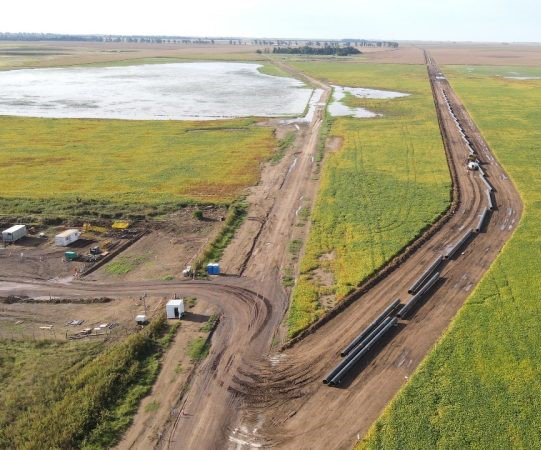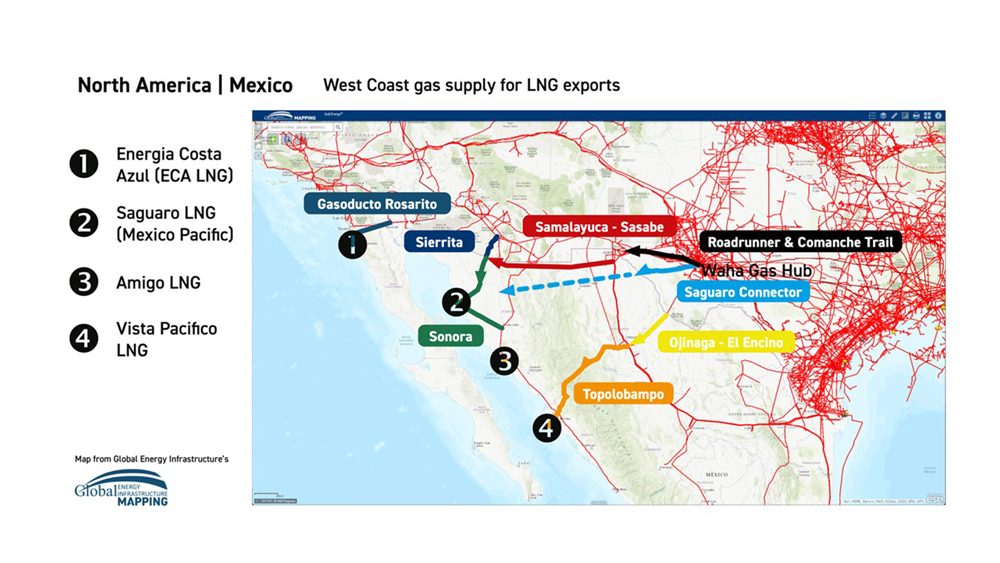July 2024, Vol. 251, No. 7
Features
New Gas Pipeline Projects Underway Across Latin America
By Mauro Nogarin, P&GJ Correspondent, South America
(P&GJ) – In Latin America, at the moment, there are a series of projects to build, expand and rehabilitate gas pipelines, which are of great importance to the strengthening of midstream infrastructure of those countries.
Argentina
The state-owned company Energía Argentina signed a memorandum of understanding (MOU) with Petrobras for three years in order to transport gas from Vaca Muerta to the provinces of northern Argentina.
This work consists of reversing the flow direction of four compressor stations of the North Gasduct.
The compressor plants that will be changed direction are those of Ferreyra and Deán Funes in the province of Córdoba; Lavalle, in Santiago del Estero, and Lumbreras, in Salta, of the Northern Gasoduct operated by the Argentine company TGN.
At the end of April, the welding of the 36-inch pipes began in the municipality of La Carlota (Cordoba), where the gas pipeline for one of the main works of the 76-mile (122-km) project, called the Tío Pujio-La Federal Integration Gasduct, begins. Carlota, which allows linking the Central West Gasduct with the North Gasduct.
Bolivia
The state oil company YPFB confirmed that the works of the expansion of the Sucre-Potosí Gas Pipeline (GSP) Phase II.
The construction of the GSP Loop, Río Pilcomayo-Mariaca section, allowed an increase in capacity from 10.3 MMcf/d to 13.6 MMcf/d.
This work will increase the transportation capacity to satisfy the growing market demand in the Potosí region thanks to the construction of the new cement plant, in addition to guaranteeing the supply of natural gas for domestic use, commercial activities and other industries.
The new 10-inch, 8.6-mile (14-km) loop pipelines in the Río Pilcomayo – Mariaca section.
Brazil
The Brazilian company Gasmig confirmed that work has begun to build the expansion of the Central-West Gasduct, an infrastructure that will allow an increase in its extension of approximately 186 miles (300 km), that is, an increase of 23% in the company’s current network.
The project’s natural gas consumption potential is 8.1 MMcf/d (230,000 cm/d).
For this work, the Brazilian company Tuper is supplying 75 miles (120 km) of API 5L Pipes with a triple-layer polyethylene external coating, in variable diameters from 2 to 10 feet.
The gas pipeline will connect eight mining municipalities: Betim, Divinópolis, Igarapé, Itaúna, Juatuba, Mateus Leme, São Joaquim de Bicas and Sarzedo. Together, these cities represent 7% of the gross domestic product (GDP) of Minas Gerais and have approximately 1 million inhabitants.
Colombia
The CEO of Ecopetrol officially said the company is working with the government of Venezuela to reactivate the Antonio Ricaurte gas pipeline. To date, the CEO of the state company Ecopetrol confirmed that PDVSA and Cenit have already carried out a tour of the infrastructure of more than 124 miles (200 km) to establish the conditions of the gas pipeline.
Ecopetrol has estimated that the rehabilitation of the gas pipeline would take between 10 and 12 months and would cost $300 million. In addition, there is currently a contract in force between Ecopetrol and PDVSA that allows the transportation of gas through this gas pipeline.
The CEO of Ecopetrol stated that solutions are being sought to lift Ofac restrictions for the eventual transaction of gas from Venezuela to Colombia, probably through a private agreement between the two companies.
The Antonio Ricaurte gas pipeline has a transportation capacity of 450 MMcf/d (12.7 MMcm/d), which represents 45% of Colombia’s consumption.
The Antonio Ricaurte gas pipeline has a length of 140 feet (225 km), connecting the eastern coast of Lake Maracaibo in Venezuela with Punta Ballenas in Colombia’s Guajira, of which 56 miles (90 km) pass through Colombian territory and has been abandoned for 10 years.
Chile
The state oil company ENAP confirmed the environmental file for the project to build the gas pipeline in Magallanes.
The Environmental Evaluation Service (SEA) agreed to begin the project's process that includes the construction of a gas pipeline that will transport natural gas to the Clarencia Measurement Center.
The new infrastructure is in the municipality of Primavera, which belongs to the region of Magallanes and Chilean Antarctica and consists of the construction of a new gas pipeline, intended for the transportation of natural gas from the Sara Compressor Station to be delivered to the Clarence Measurement.
The gas pipeline is made up of carbon steel pipes with an external coating of three-layer polyethylene, with a diameter of 6 inches and an estimated length of 35 miles (56 km). A fiber-optic cable will also be installed for the transmission of electrical signals and control data.
Mexico
The Federal Electricity Commission (CFE) and Energía Mayakan, from Engie, signed an agreement for the expansion of the Mayakan gas pipeline, with the objective of guaranteeing the transportation of natural gas for the generation of energy demanded by the Yucatan Peninsula.
The expansion of Mayakan will allow the natural gas transportation capacity to be doubled, going from 250 MMcf/d (7 MMcm/d) to 567 MMcf/d (16 MMcm/d), through the construction of a 435-mile (700-km) gas pipeline.
In addition to promoting the interconnection with the Puerta del Sureste gas pipeline, which provides natural gas by sea from Brownsville, Texas, to Tuxpan and Coatzacoalcos, in Veracruz; and Paraíso, Tabasco, which will interconnect with Mayakan in Cactus, Chiapas.
Engie’s project would take gas from state oil company Pemex’s Cactus processing plant in the state of Chiapas and direct it to Valladolid, in the state of Yucatán.







Comments